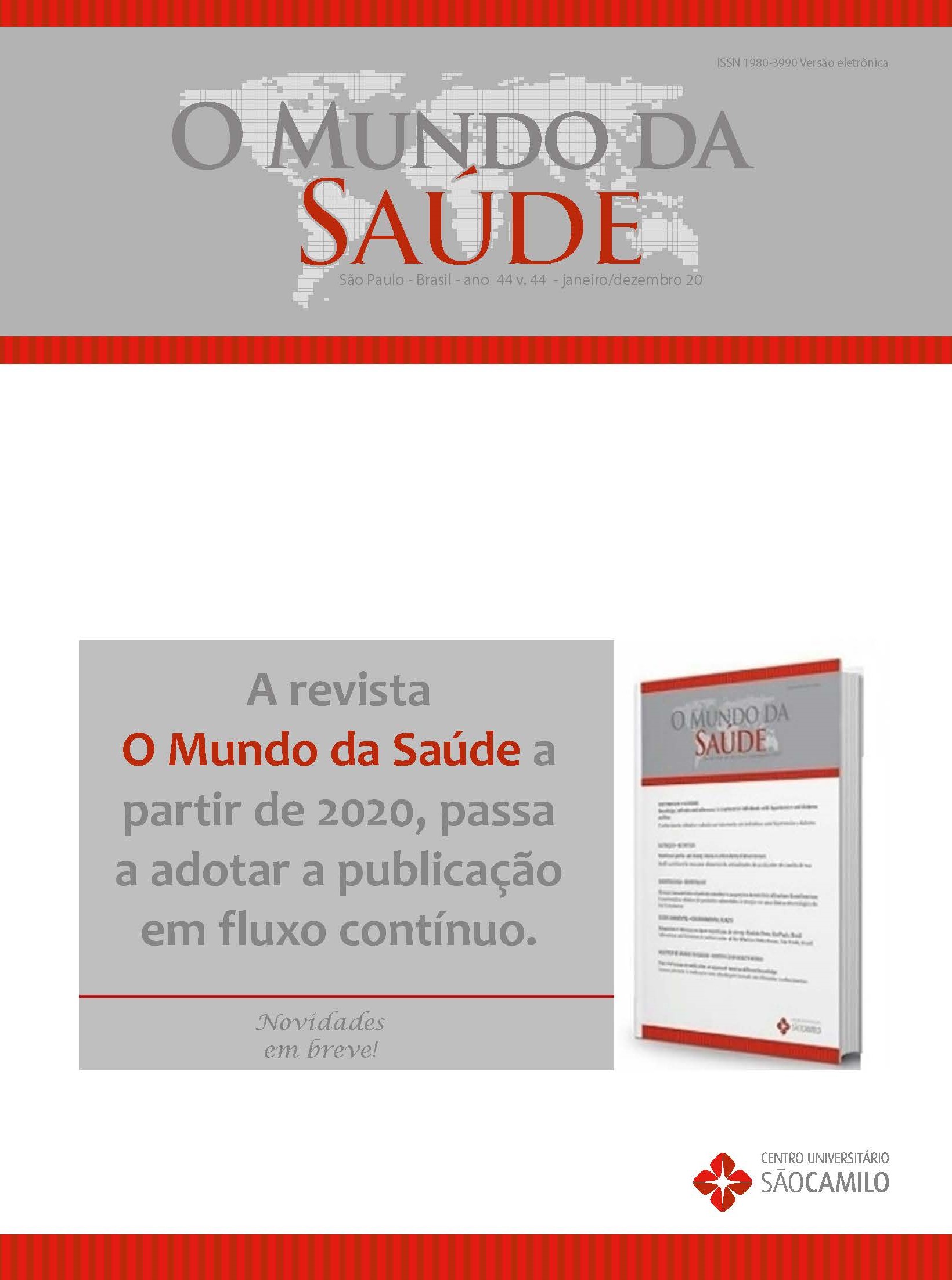Preeclampsia in pregnancy from the perspective of women in the Northwest region of the State of Rio Grande do Sul, Brazil
DOI:
https://doi.org/10.15343/0104-7809.202044498505Keywords:
Pregnancy, Prenatal care, Preeclampsia, Nursing, Qualitative researchAbstract
Preeclampsia represents one of the main causes of maternal death in the world. The objective was to identify the
women's knowledge about preeclampsia in pregnancy. This was a qualitative, exploratory, and descriptive study with
26 women linked to the Pastoral da Criança care service. In order to collect the data, a conversation circle was held
in 2014 to discuss and apply a questionnaire with open and closed questions, the data being analyzed by thematic
content analysis. The predominance of women of childbearing age who have already experienced motherhood was
identified and, therefore, the possibility of complications during pregnancy was exposed. One of the respondents had
the disease during pregnancy, seven had some knowledge about the subject, and 19 of them were unaware of the
disease. Prenatal care is identified as a way of clarifying the disease and its risk factors. It is necessary to train prenatal
and multiprofessional caregivers in assisting women, including health education actions that contribute to improving
women's knowledge about the diseases that permeate the gestational period.
Downloads
References
Disponível em: https://www.paho.org/bra/index.php?option=com_content&view=article&id=5741:folha-informativa-mortalidadematerna&
Itemid=820
2. Kahhale S, Francisco R, Zugaib M. Pré-eclampsia. Rev Med. 2018; 97(2):226-34. https://doi.org/10.11606/issn.1679-9836.
v97i2p226-234
3. Mayrink J, Costa ML, Cecatti JG. Preeclampsia in 2018: Revisiting Concepts, Physiopathology, and Prediction. ScientificWorldJournal.
2018:6268276. https://doi.org/10.1155/2018/6268276
4. DATASUS. Indicadores de Mortalidade; 2018 [citado 2020 set 18]. Disponível em: http://tabnet.datasus.gov.br/cgi/deftohtm.
exe?idb2010/c18.def
5. FEBRASGO. Pré-eclâmpsia nos seus diversos aspectos. São Paulo: Federação Brasileira das Associações de Ginecologia e Obstetrícia
(FEBRASGO); 2017 [citado 2020 set 18]. Disponível em: https://www.febrasgo.org.br/media/k2/attachments/12-PRE_ECLAyMPSIA.
6. Calixto AC, Brandão AHF, Toledo LL, Leite HV, Cabral ACV. Predição de pré-eclâmpsia por meio da dopplerfluxometria das
artérias uterinas e da dilatação fluxo-mediada da artéria braquial. Radiol Bras. 2014; 47(1):14-7. http://dx.doi.org/10.1590/S0100-
39842014000100008
7. Amorim FCM, Neves ACN, Moreira FS, Oliveira ADS, Nery IS. Perfil de gestantes com pré-eclâmpsia. Rev Enferm. 2017; 11(4):1574-
83. https://doi.org/10.5205/reuol.9763-85423-1-SM.1104201703
8. Andrade RD, Santos JS, Maia MAC, Mello DF. Fatores relacionados à saúde da mulher no puerpério e repercussões na saúde da
criança. Esc Anna Nery. 2015; 19(1):181-6. https://doi.org/ 10.5935/1414-8145.20150025
9. Guevara-Ríos E. La preeclampsia, problema de salud pública. Rev Peru Investig Matern Perinat. 2019; 8(2):7-8. https://doi.
org/10.33421/inmp.2019147
10. Barbosa MEM, Bertelli EVM, Aggio CM, Scolari GAS, Marcon SS, Carreira L. Fatores associados à adesão de adultos/idosos ao
tratamento da hipertensão arterial na atenção básica. Rev Enferm UERJ. 2019; 27:e45894. http://dx.doi.org/10.12957/reuerj.2019.45894
11. Peraçoli JC, Borges VTM, Ramos JGL, Cavalli RC, Costa SHAM, Oliveira LG et al. Pré-eclâmpsia/Eclâmpsia. Rev Bras Ginecol
Obstet. 2019; 41(5):318-32. https://doi.org/10.1055/s-0039-1687859.
12. Rolim KMC, Costa RD, Thé RF, Abreu FRH. Agravos à saúde do recém-nascido relacionados à doença hipertensiva da gravidez:
conhecimento da enfermeira. Rev Enferm Atenção. 2014; 3(2):19-28. https://doi.org/10.18554/
13. Minayo MCS. Amostragem e saturação em pesquisa qualitativa: consensos e controvérsias. Revista Pesquisa Qualitativa. 2017
[citado 2020 set 18]; 5(7):01-12. Disponível em: https://editora.sepq.org.br/index.php/rpq/article/view/82/5914. Minayo MCS. O desafio do conhecimento: pesquisa qualitativa e saúde. 14ª ed. São Paulo: Huciter; 2014.
15. Ferreira MBG, Silveira CF, Silva SR, Souza DJ, Ruiz MT. Assistência de enfermagem a mulheres com pré-eclâmpsia e/ou eclâmpsia:
revisão integrativa. Rev Esc Enferm. 2016; 50(2):324-34. https://doi.org/10.1590/S0080-623420160000200020.
16. Silva MLC, Galvão ACAA, Souza NL, Azevedo GD, Jerônimo SMB, Araújo ACPF. Mulheres com risco cardiovascular após
pré-eclâmpsia: há seguimento no Sistema Único de Saúde? Rev Latinoam Enferm. 2014; 22(1). https://doi.org/10.1590/0104-
1169.3197.2389
17. Andrade UV, Santos JB, Duarte C. A percepção da gestante sobre a qualidade do atendimento pré-natal em UBS, Campo Grande,
MS. Rev Psicol Saúde. 2019; 11(1):53-61. http://dx.doi.org/10.20435/pssa.v0i0.585
18. Delwing LPB, Hahn GV. Assistência à gestante de alto risco em ambulatório especializado. Revista Destaques Acadêmicos (Lajeado).
2016 [citado 2020 set 18]; 8(3). Disponível em: https://www.univates.br/bdu/bitstream/10737/1186/1/2015LuisaPereiraBckerDelwing.
19. Ferreira SS, Martins AC, Magalhães AC, Martins H. Ácido acetilsalicílico na prevenção da pré-eclâmpsia: uma revisão baseada
na evidência. Rev Port Med Geral Fam. 2017 [citado 2020 set 18]; 33:118-32. Disponível em: http://www.scielo.mec.pt/pdf/rpmgf/
v33n2/v33n2a04.pdf
20. Thuler ACMC, Wall ML, Benedet DCF, Souza SRRK, Souza MAR. Medidas preventivas das Síndromes Hipertensivas da Gravidez na
atenção primária. Rev Enferm. 2018; 12(4):1060-71. https://doi.org/10.5205/1981-8963-v12i4a234605p1060-1071-2018






























